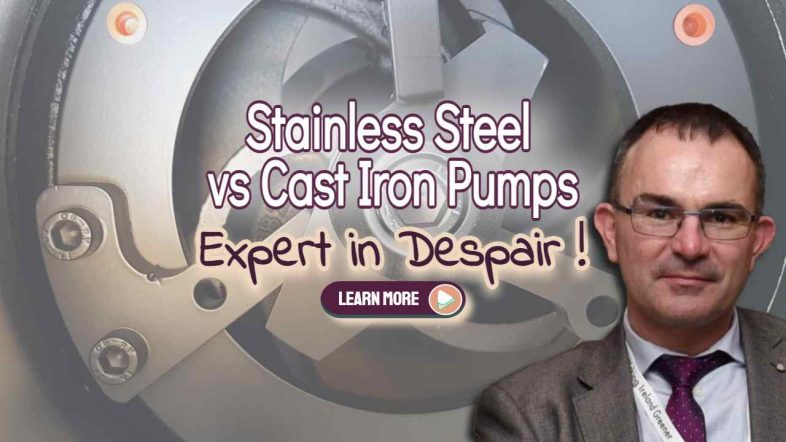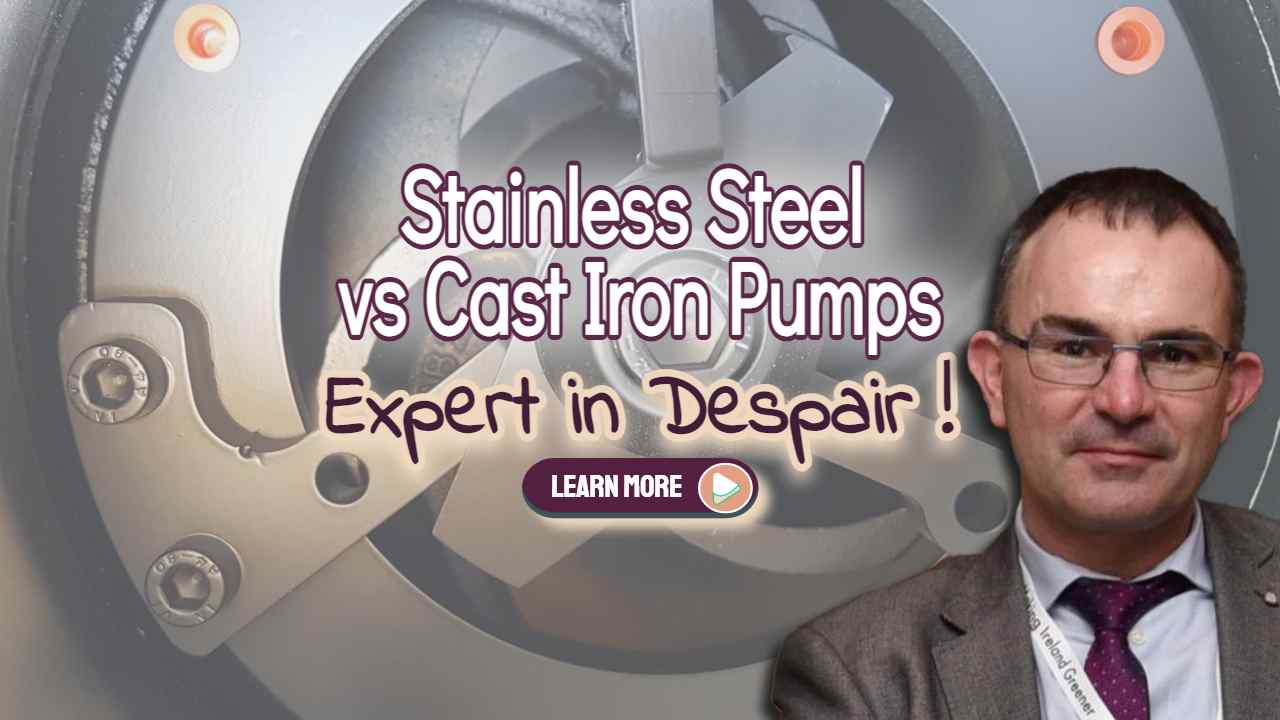A well-known mixer and pump expert has declared his despair after again seeing a lack of appreciation for the superiority of stainless steel vs cast iron pumps, especially in anaerobic digestion. So much so that he has risked embarrassing pump sellers and specifiers by calling out their poor choice of materials in this crucial area.
The press release in question (provided below) is a repost. It was first published in October 2021 by mixer and pump expert Paul Davies, who has all the experience you could ask for to confirm that he knows what he is talking about.
Press Release 15 October 2021:
By Paul Davies, from mixer and pump manufacturer – Landia – established 1933 – Inventors of the Chopper Pump in 1950
Sometimes, I do despair.
I’ve just read a glowing article about how some cast iron mixers – not surprisingly – failed in a food waste application at a biogas plant.
The article then gives a rosy description about how these failing cast iron mixers have been replaced by………….another brand of cast iron mixers!
I despair of course because I don’t think you have to be a certified, professional engineer to know that with food waste’s typical low pH, stainless steel mixers should be used – not cast iron!
What a waste of time and what a waste of money to address the same low pH problem with more cast iron that is doomed to fail – yet the article isn’t shy of telling the reader just how wonderful and fluffy this all is for the environment. In a short time, they certainly won't be showing us pictures of the failed mixers on their way to the scrap heap.
Choose the best possible use of precious resources
At a time when there is at last such a strong recognition to make the best possible use of precious resources, why do such short-sighted decisions like this continue? Perhaps it is because some need or believe they need a new mixer, right now. Or, do they shy away from stainless steel because it will cost more?
Often it is no more the case that people buy what they’ve had before. In these circumstances, it's difficult to hold a local distributor accountable for providing an off-the-shelf item to a site during a critical moment.
But the vast majority of today’s equipment suppliers like to work with manufacturers to find better, robust solutions that are truly designed for the job.
Biogas Plant Operators: Don't be tempted by a quick-fix re-order that you regret later
A quick fix might do the job in certain applications, but not for food waste. So that we can provide the right, long-lasting, reliable equipment that is also actually far, far cheaper in the long run, we always ask for key information about the pH of the tank’s contents, the dissolved solids, abrasiveness, and much more to help our customers bring about the right solution.
I had to read one part of the article a few times to believe what it was saying. Yes, some applications are super aggressive—but here it was proudly stating that hopefully, a new mixer wouldn’t have to be replaced… ‘within a year.’
That's certainly not a financially sound investment!
A pump set lifetime of 20 to 25 years is routine at Landia
The vast majority of our pumps and mixers have a 20-25-year lifetime.
Furthermore, the photos—very well taken—show the new mixers being lowered down inside the tank. As soon as there is a problem—which is inevitable—the whole biogas process will have to stop so that those failing mixers can be retrieved. This presents numerous health and safety issues, as well as a costly disruption to the process. Mixers mounted outside the tank are so much better, safer, and easier to service.
As we head towards 2022, there is still huge room for improvement in mixer and pump specifications for food waste/biogas plants. It’s a very tough environment, so best not to purchase equipment that is going to get “eaten alive”.
– PR Ends –
We looked online for information on the issues of stainless steel vs cast iron pumps in general, and the following is what we found:
Stainless Steel vs Cast Iron Pumps: Selection of Impeller material
The material and quality of the impeller are the components that will have the greatest impact on the flow characteristics and the longevity of the entire pump. Therefore, when purchasing pumps, the material selection of the pump impeller is of primary importance.
For most pump applications, the selection is between cast iron, stainless steel, and bronze impellers. Pump casings/housings/volutes may also be made from cast iron or steel, and the same issues apply but to a lesser extent.
Bronze doesn't rust, but cast iron does. Bronze is a relatively soft material, and in dirty water applications, it suffers from a loss of surface material due to abrasion. The wear reduces the efficiency of the pump and, if not attended to, wastes power/money. Eventually, the ability to pump and/or mix the reactor is compromised. The plant must be shut down and rendered safe for access before pump repairs can be carried out. Every minute of downtime will cost the plant operator in lost biogas production.
The impeller material must be chosen for both chemical compatibility and wear resistance. Most corrosion-resistant materials are too soft for the demands of a pump impeller.
So, in the end, it comes down to a choice of cast iron versus stainless steel.
Impeller Material: Duplex SS
For Continuously Stirred Tank Reactors (CSTRs or simply “digester tanks”), duplex stainless steel (SS) material has an excellent reputation. In terms of rust, an SS impeller will often stand up extremely well.
Many users have reported their SS impellers to show no signs of corrosion or erosion over a number of years of use.

Why Use a Stainless Steel Impeller for Biogas Plant Substrate/Digestate Mixing and Pumping?
Bronze and cast iron impellers and pump casings can rapidly corrode and erode when exposed to corrosive mediums such as biogas plant substrate/digestate, seawater, sewage, wastewater, chlorine, bromine, and other chemicals.
Plastic materials can be made for their excellent chemical resistance but wear too rapidly in pump impeller applications and when solid particles are present. So far, no pumps we know of are available for sale that use carbon fibre.
Should You Consider Stainless Steel Impellers?
Bronze impellers are known to have wear problems with passing sand, silt, and grit. Changing to stainless steel (316) can result in impeller life rising drastically.
The cost of repeated maintenance and new parts can be considerable for many cast iron installations when pumping biowaste. If increased maintenance is needed, calculations soon show that the best choice for the lowest life cycle cost can be ISO G6.3 balanced stainless steel impellers.
These impellers have been noted online for:
- running vibration-free,
- providing long-term sustainable hydraulic performance,
- their reduced corrosion potential, and
- application flexibility.
Mixer and Pump Cast Iron vs Stainless Steel Review by Comparison
While researching this article, we found several cast iron sump pump reviews, by comparison, but only for sump pumps. These are high-volume consumer items, and manufacturers may allow potential buyers to select the pump construction options a site visitor may wish to compare and review. Review for those pumps may include pump housing, volute, and impeller options. Unfortunately, although these are available for submersible sump pumps, none were found for biogas mixers or bio-reactor substrate pumps.

Conclusion – Cast Iron vs Stainless Steel Impellers
All stainless steel construction-type mixers and pumps have proven the lowest lifetime cost when handling biowaste in anaerobic digestion plants.
Although options such as cast iron housings with bronze impeller components can be a great and cost-effective combination for clean water applications, the same does not apply to most dirty water applications.
Stainless steel is corrosion- and abrasion-resistant in fermentation reactor applications. It is the recommended choice for use in pumps that need to mix and pump water with entrained grit, sand, and silt-containing liquids. An example is the pump and mixers used in anaerobic digestion (biogas) CSTR plants.
[First published 18 March 2021.]







Thanks for the opportunity to review your information!